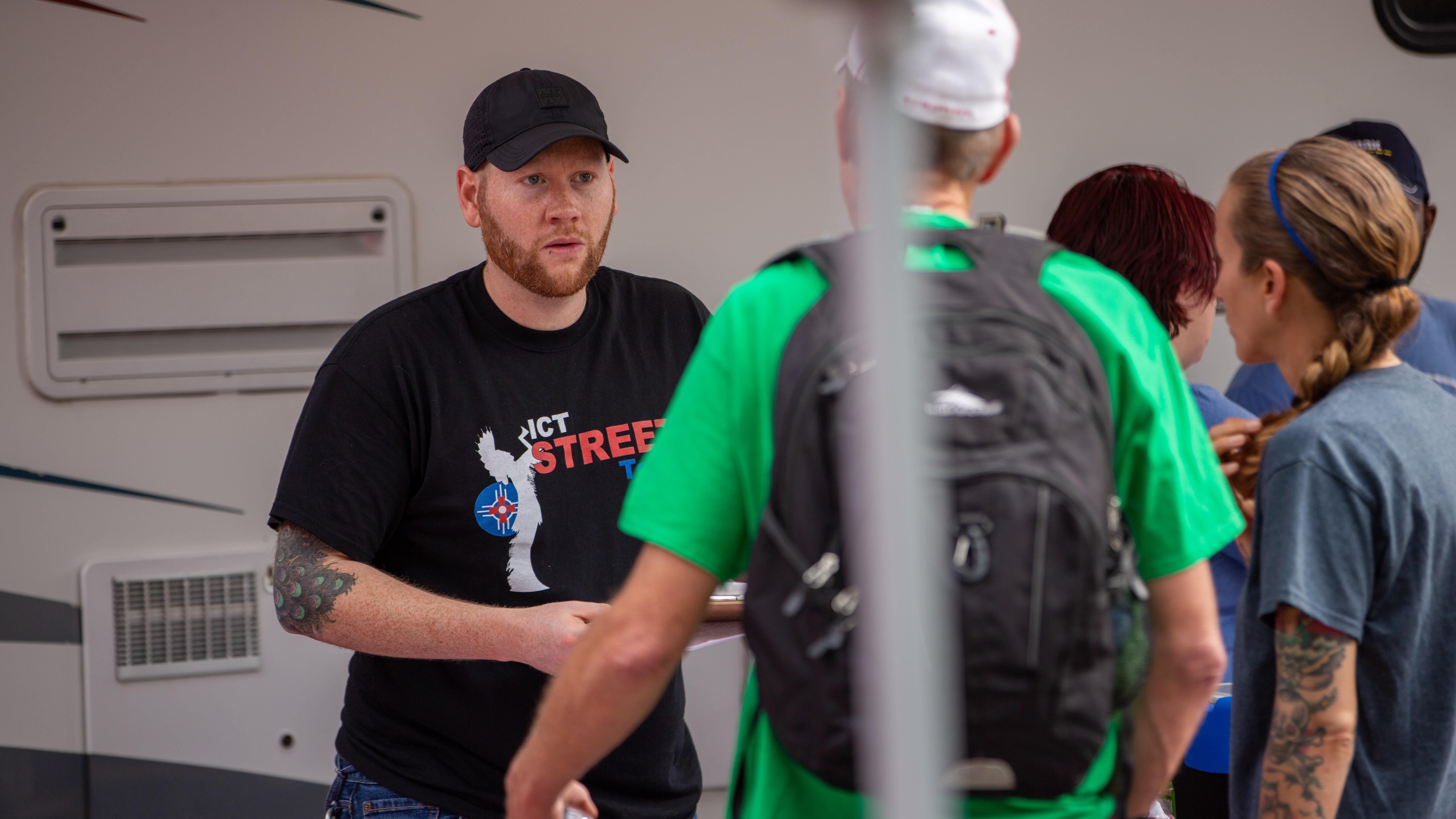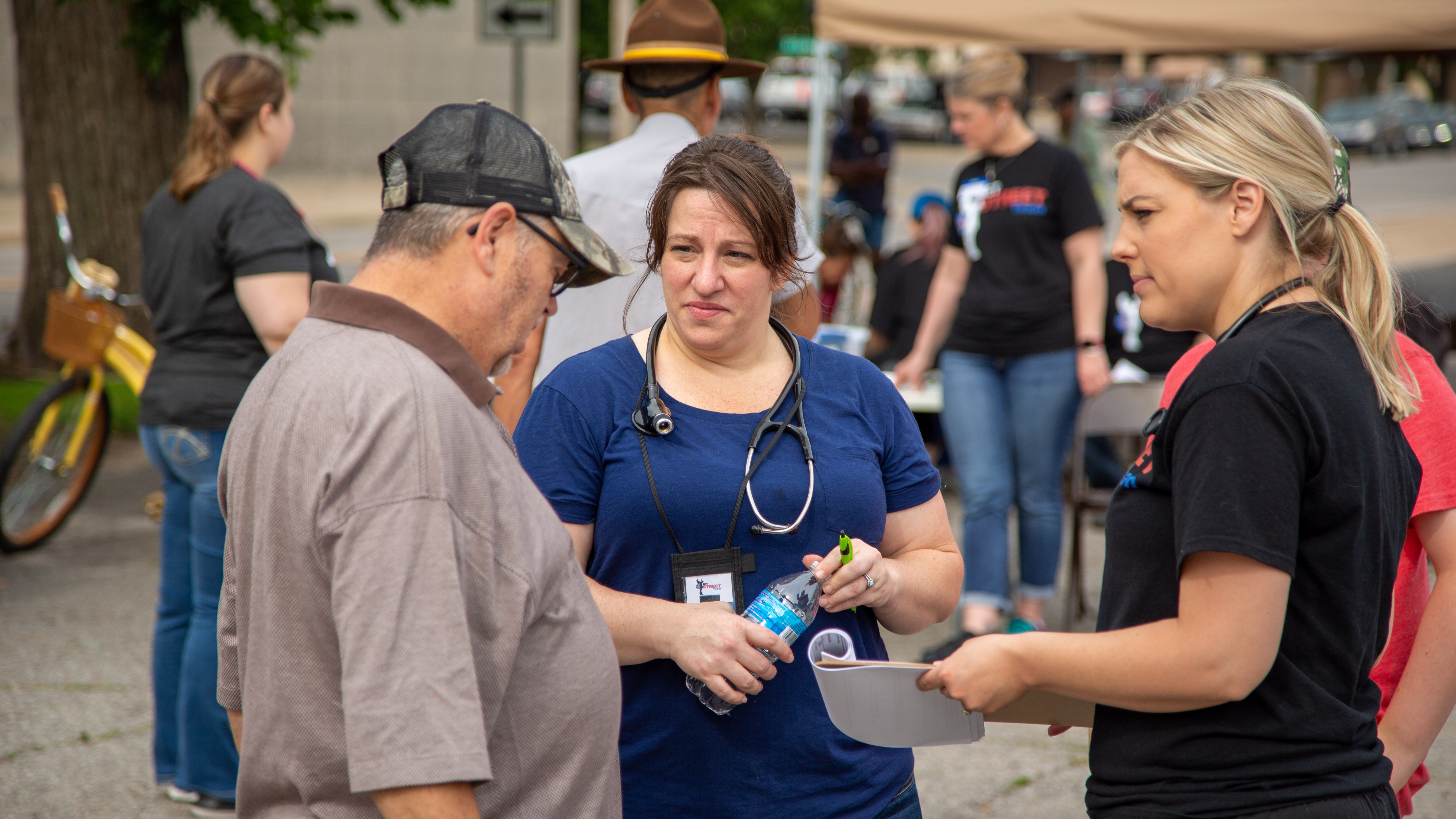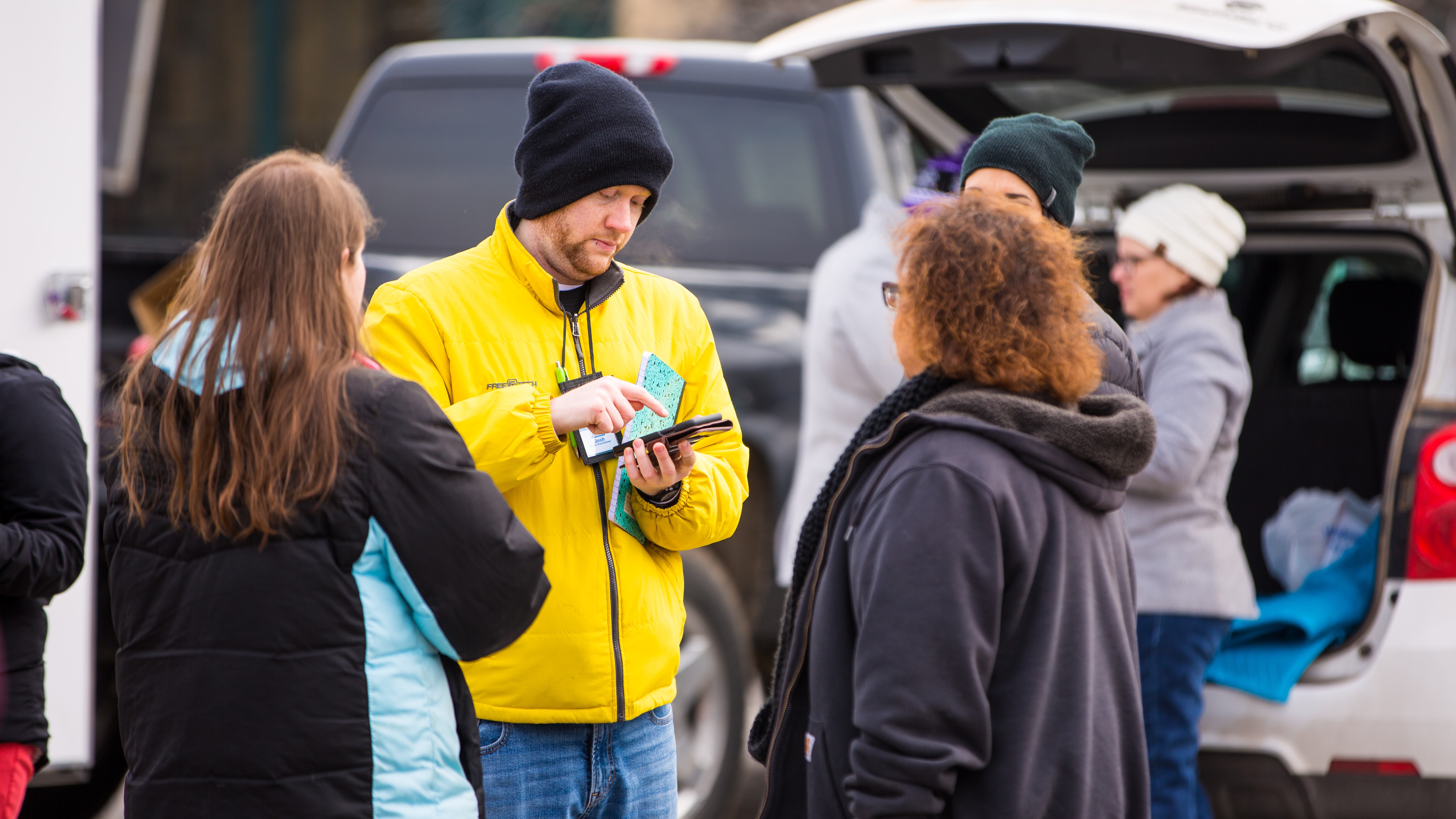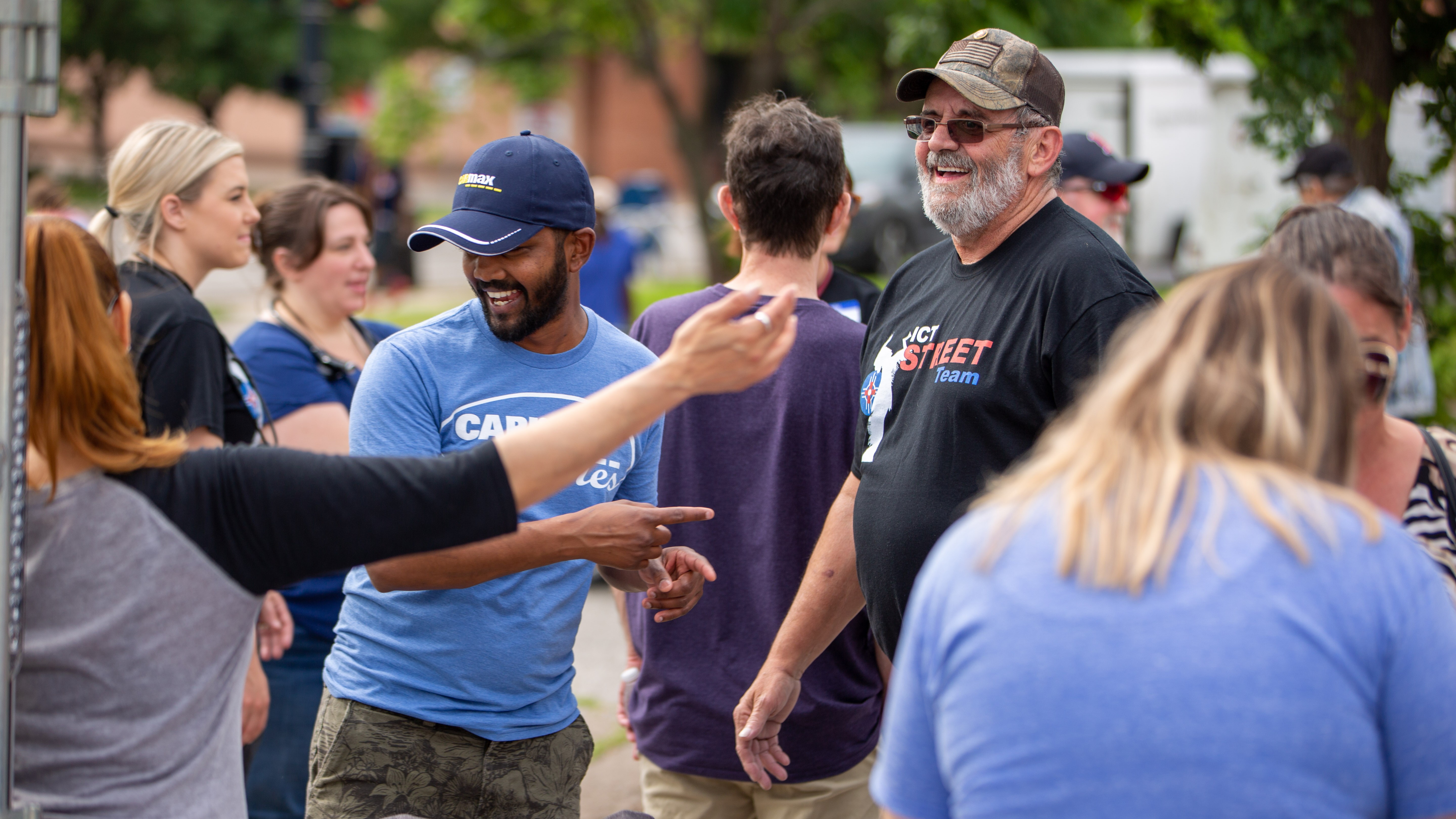Medicine on the move: How Joshua Reed and the ICT Street Team are bringing critical care to those who need it most
When nurse practitioner Joshua Reed meets with his patients, he doesn’t see them at
a traditional medical office. There’s no waiting room, no front desk, and no need
to call and make an appointment.
Instead, Reed and the other members of the Wichita, Kansas-based ICT Street Team provide
care to individuals experiencing homelessness directly where they are at — whether
that is in an alleyway, under a bridge or at an encampment somewhere in the city.
Reed is a former K-State student, and he founded ICT Street Team in order to remove
barriers that can prevent those experiencing homelessness from accessing the care
they need to be safe and healthy. The team has invested countless hours toward building
a reputation of trust, compassion and consistency.
“It doesn't matter if one of our clinic days falls on a holiday; it doesn't matter
if it's raining, if it's 100 degrees, if it's a snow storm,” Reed said. “We have somebody
from our organization at the same place at the same time every single week, because
that consistency allows individuals to know where we're going to be. And they don't
have to call us and contact us if they need something. They know where to find us.”
Reed was inspired to pursue a career in healthcare by his grandmother, who served
as a registered nurse for more than 50 years and retired from Lafene Health Center
on the K-State campus. At the time, Lafene offered inpatient hospital services, and
his grandmother worked a mixture of day and night shifts.
“I remember going to visit her when I was fairly young,” Reed said. “We'd stop by
at random hours and see how she was doing. And I was just always fascinated by the
work that she did. My mother, in turn, was originally in nursing, and then went into
healthcare administration, and then subsequently, my brother is a registered nurse.
His wife happens to be a nurse practitioner, and then I went into nursing.”
When Reed came to K-State, he originally studied food science and food microbiology.
Although he was excited about the science aspect of his work, he came to realize that
life in the laboratory was not the right path for him. He missed being around people
and engaging with individuals directly. Based on his family legacy, nursing seemed
like a natural fit.
Back then, K-State did not have a nursing program (the university now offers a Physician Assistant Program and Pathway to Nursing Program in partnership with Wichita State University). He was able to transfer a number of
courses that he took as a food microbiology student, providing a foundation for him
to bring his dream to reality.
During his time as an emergency room nurse, Reed witnessed firsthand some of the challenges
that people experiencing homelessness have to overcome in order to access medical
care. Some of the serious medical problems these patients were facing had started
out as relatively minor issues that could have been treated easily if caught earlier.
After finishing his additional training to work as a nurse practitioner, he served
in a public health clinic in Wichita that offered free primary care services for unhoused
individuals.
“What I found fascinating about that, is that even though you could be seen at that
clinic free of charge if you were unhoused, we still did not see that many individuals
who were unhoused,” Reed said. “And it always made me wonder why that would be. We'll
see them for free; I wonder why we can't get them to come in?”
One patient’s story stuck with him, and kick-started his journey to launch the ICT
Street Team.
Reed remembers treating a man in his 50s who came in, initially saying that he needed
a refill on blood pressure medication. However, the man’s vital signs were abnormal,
he was running a fever, and his heart rate was high. Reed eventually discovered the
man had a wound on his foot where he had cut himself several weeks ago.
“[He] was trying to doctor it at home, but lived in a camp that was down by the river,
which was probably fairly unhygienic, and he was really embarrassed by the fact that
he had this wound. And after finally being able to convince him to allow me to take
a look at it, it was pretty obvious to me that it was a really severe infection.”
He was diagnosed with a bone infection and underwent two amputations, and tragically
ended up dying from complications of a bloodstream infection.
“It really irritated me, because I just kept thinking he literally needed a $4 antibiotic
when this was an initial cut,” Reed said. “A $4 antibiotic would have sufficed and
probably cleared this up, and we wouldn't be here. And so from there, that sent me
down a rabbit hole of trying to figure out, what research has been done on trying
to reach these individuals, what's the problem? Why are these individuals not seeking
care when there are clinics available?”
Reed refused to give up until he had some answers.
He loaded up a backpack with basic supplies, and after dark went to visit homeless
encampments, under bridges and other places where people experiencing homelessness
were gathering. He started talking to individuals so he could hear, in their own words,
what their circumstances were like and what barriers they were encountering.
“Somebody like myself, I've never been unhoused, I've never experienced homelessness,”
Reed said. “It doesn't make sense for me to sit around and come up with ideas on how
to create programs to serve these individuals. And that's what we have a tendency
to do. What I did was try to re-empower individuals to tell me what it is that they
needed.”
If people experiencing homelessness are having trouble meeting their basic needs —
such as obtaining food, shelter and safety — a health issue may get placed on the
back burner. Service providers may only be open 8 a.m. to 5 p.m. Mondays through Fridays,
and there might not be enough time in a day for an unhoused individual without access
to transportation to walk to a primary care clinic. The individual also might not
have a phone or computer to contact their medical provider.
“It really forced individuals to make kind of that odd decision of, ‘Do I want to
eat, or do I want medicine?’” Reed said. “On top of that, even if an individual got
to the clinic, I would write them a prescription for a medication that they couldn't
afford to fill, and they would then have to go to a pharmacy, which may be another
mile away. None of it made any sense when you really looked at it from the aspect
of the individual with the lived experience.”
He discovered an international organization called the Street Medicine Institute, which advocates for providing care to those experiencing homelessness right where
they are, on their own terms — whether that is in an alleyway, under a bridge or within
an urban encampment. He also encountered the Kansas City-based program called Care Beyond the Boulevard.
The ICT Street Team started as what Reed calls a “one man show with a backpack with
no funds” and is now a 501(c)(3) nonprofit. This past year, they had just over 2,400
visits.
“We have patients that return monthly, if not weekly, to see us and follow up on their
health care,” he said. “We're able to draw lab work; we have point of care testing
machines. That means when we see somebody, we draw their blood work, we run it through
a machine, we have the results for them within 15 minutes, so that we know things
like what electrolyte levels are, kidney function, etc. We have a mobile pharmacy
with our mobile medical unit, and so we've got pharmacy technicians and pharmacists
that go out with us. They get the medication at the time of service, and then we follow
up with them routinely.”
The organization hosts clinics all over Wichita, and also makes rounds through established
homeless encampments.
Last year, the organization logged 2,807 volunteer hours, with an average volunteer
time of about 90 hours. Reed also thanks the state of Kansas for supporting the type
of work done by the ICT Street Team; medical professionals with a license who would
like to volunteer their time can have their medical activity insured by the state.
There’s also a program that allows retired medical professionals who want to volunteer
to maintain a charitable care license without paying fees.
Reed said he’s grateful for all the support received by the ICT Street Team, and he
wants to continue raising awareness.
“The need, unfortunately, has grown a lot, and even just this last year, the number
of new patients that we saw went up drastically. That's not because we're more effective.
It's because there are more people on the streets.”
Reed said there is a misconception that homelessness is only a problem in certain
places. But it exists even in cities like Manhattan, Kansas, and people don’t always
think about the fact that they could be a few missed paychecks away from having nowhere
to live.
“The reason we don't know it exists is because we don't want to see it,” Reed said.
“It's a problem everywhere. And if we don't recognize and admit that it's a problem,
we'll never be able to address it. Invisible problems can't get fixed.
“These are people that have been our neighbors and the members of our church, our
community, our brothers, our sisters, our nephews — all these individuals are somebody’s
somebody, and they're not there because they make poor life choices. They're there
because things happen, unfortunately, in life.”




